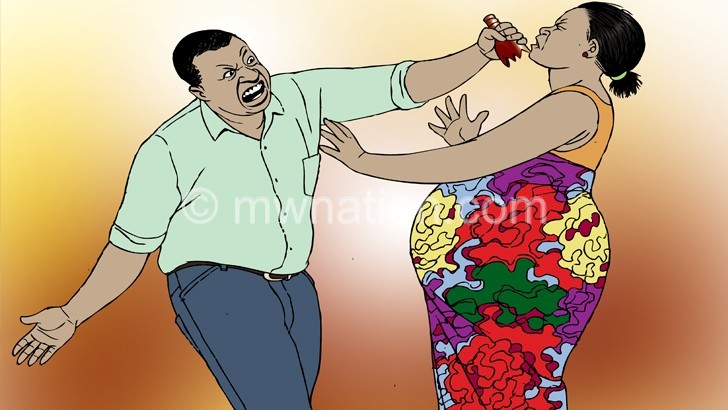Nice fight against GBV
The fires of fury over the disputed presidential polls of 2019 exposed creases in Malawi’s democracy.
For policymakers, the burning and looting constituted a call for nationwide efforts to rid the seven-year-old democracy blighted by violence, male dominance and kickbacks.

The brainchild—National Initiative for Civic Education (Nice) Trust—has its footprints in all 28 districts and four cities, entrenching a culture of tolerance, participation, voting and other tenets of democracy.
For two decades and counting, the initiative, now a public trust, has become the largest provider of civic education on election and governance affairs,
However, public demand is rising that its nationwide workforce cannot confine itself to periodic polls and governance any longer.
The concerned citizens want Nice workforce to reach even the remotest communities with accurate messages on emerging and prevailing issues silently dimming the lamp of democracy Malawians elected in 1993.
They feel a better Malawi for everyone will remain work in progress unless civic education tackles persisting and emerging issues.
“Nice is a great idea because some of us dropped out of school too early,” says Lucy Kampheta. “Civic education helps close information gaps, but it should go beyond voter education and other political messages.”
The mother of three in Bimphi Village, Traditional Authority Msakambewa in Dowa, backs new strategy to expand its focus to include efforts to end gender-based violence (GBV).
In 2013, she survived a blinding beating at the hands of a man she called her husband since she was 15.
“He beat me in the face like a boxer. When I fell down, he stepped on my face with boots, leaving my left eye unable to see properly for two years,” she recounts.
Kampheta says “her only crime” was asking the man why he was having sex with different women.
She recalls: “My husband used to spend nights away from home though he wasn’t a drunkard.
“He wasn’t the same man who impregnated me 15 years ago, forced me to drop out in Form One and banned me from doing business.”
Kampheta now raises two girls and a boy singlehandedly.
She regrets believing his promise to give her a K350 000 parting shot and K30 000 monthly maintenance package.
“He just disappeared without leaving anything for the children. It’s like their father are dead,” says the woman, who sells vegetables to meet her household needs.
She has become a trusted voice against GBV. Together with Nice volunteers in her rural area, she goes door-to-door and publicly shares her agony to illustrate how violence wrecks homes, worsens poverty and leaves women and children destitute.
“GBV remains a big problem in the country despite concerted efforts to stop it, so organisations as big as Nice cannot ignore it anymore. They have to use their nationwide structures and allies to end this evil,” she says.
Sexual and physical GBV keep haunting women and girls in Malawi. During the Malawi Demographic and Health Survey of 2016, one in three women aged 15-49 reported experiencing physical violence, 14 in100 sexual violence and about a quarter emotional violence in the preceding year.
Eliminating violence against women and girls through transformative civic education is pivotal to the Spotlight Initiative underway in Mzimba, Nkhata Bay, Ntchisi, Dowa, Nsanje and Machinga.
Nice is part of the world’s largest targeted effort to end violence against girls and women.
“Gender issues are human rights issues, which are pivotal to democracy—majority rule. You cannot talk about democracy without talking about women or safeguarding their rights. They constitute over half of our population,” says Gray Kalindekafe, who coordinates Nice gender programming.
He says GBV retards women participation in public life. This year, Nice activated a new five-year strategy “to create a well-informed, empowered, responsive and transformed Malawian society that actively participates in public life”. Its pillars include cross-cutting issues such as gender equality and women’s empowerment, HIV and Aids as well as sexual and reproductive health rights,
Its civic education officers and 10 000 volunteers do not only support calls for equal representation of men and women in politics, but also senstise the citizenry to the ills of GBV.
“Democracy will suffer if women continue to face domestic and institutional violence. This is why Nice, the largest organisation minus government and few religious groups, cannot keep quiet about gender issues,” explains Kalindekafe.
Nice uses social dialogues, meeting people in their settings to trigger honest conversations that help them realise their challenges and find solutions.
“GBV is a cultural issue, so change will not come by force, but sustained community dialogues that respect indigenous knowledge. A journey of self-discovery leads to a lasting solution,” Kalindekafe states.
Sub-traditional authority Mizinga of Machinga encourages community leaders to scrutinise cultural practices fuelling GBV, including early pregnancies and marriages.
“When we realised that GBV and child marriages were common, we came up with bylaws that impose fines on those who don’t comply,” he says.
Minister of Gender, Community and Social Welfare launched the 16 Days of Activism against GBV with a call for public institutions, chiefs, religious leaders and other community leaders to work together to end the vice. n
Kaliati launches the 16 Days of Activism against GBV in Nkhata Bay
MASKS OF CHANGE
lNice Trust, with support from UN Women, is implementing the Spotlight Initiative to eliminate violence against women.
lThrough transformative civic education and engagement, community elders in Dowa and Ntchisi resolved to use gule wamkulu traditional dance to reduce GBV.
lEWhere a man assaults a woman, gule wamkulu dancers go to the suspect’s home and take him to the nearest police station.
lBefore being taken to the police, the violent man will have paid a goat to the gule wamkulu elders.—Nice Trust





